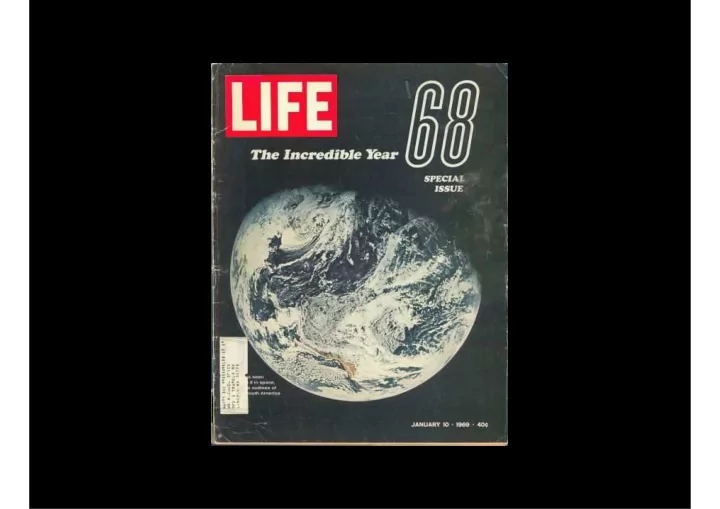

LSE, March 2010 Adapting to Climate Change (within a new economic framework)
Picking up the pieces
Today’s menu • Introduction • Economic Context • Climate Context • Solutions & Pathways to Scale Who?
1 Who, what, why
Co-founder: ENDS (1978-83, ongoing) — SustainAbility (1987-ongoing) — Volans (2008-ongoing) — — A-to-Z of Boards and Advisory Boards, from Aflatoun to Zouk Ventures Who?
Terms: climate adaptation • International Panel on Climate Change (IPCC) defines adaptation as “ adjustment in natural or human systems to a new or changing environment .” • Limits to how far e.g. island states can adapt. Who?
Terms: climate mitigation • International Panel on Climate Change (IPCC) defines as: “ An anthropogenic intervention to reduce the sources or enhance the sinks of greenhouse gases .” • The more mitigation, the less we need to adapt. Who?
Climate cacophony • “If we spent $800 billion over the next 90 years solely on the Gore solution of mitigating carbon emissions, we would rein in temperature increases by just 0.3 degrees by the end of this century.” Bjorn Lomborg Who?
2 The Economic Context
Economy
Where are we? Economy
Forms of global capitalism Pessimism Optimism Decade 2: 2011-20 Decade 1: 2001-10
3 The Climate Context
9 critical boundaries 1. Stratospheric ozone layer 2. Biodiversity 3. Chemicals dispersion 4. Climate change 5. Ocean acidification 6. Freshwater and global hydrological cycle 7. Land system change 8. Nitrogen and phosphorus cycles 9. Atmospheric aerosol loading Stockholm Resilience Centre Climate
Critical Issues ����������������������������������������������������������� ������������������������������������������������� 12 of the 14 issues tested are seen as urgent by experts. Among them are various social and economic issues such as poverty, food security, and disease. This suggests the emergence of a highly complex agenda where many diverse issues will compete for attention and resources. Climate
Corporate Leadership ��������������������������������������������������� ���������� �������������������������������������� Climate
Carbon Disclosure Project We act on behalf of 475 • ‘Climate change is like institutional investors, the Internet; it arrives holding $55 trillion in one day and gets bigger assets under management and some 60 purchasing every year, it never goes organizations such as away and you have to Walmart, PepsiCo and Cadbury. learn to make money from it.’ Paul Dickinson, CEO, CDP Climate
Phoenix 50: BYD Climate
‘The impossible takes a little longer’ Climate
4 Pathways to Scale
Pathways to Scale: 5 Stage Model 1: Eureka! 2: Experiment 3: Enterprise 4: Ecosystem 5: Economy Pathways
Stage 1: Eureka! • Craig Venter • Human genome A Life Decoded • • Algal biofuels + ExxonMobil • Synthetic biology Pathways
Stage 2: Experiment • Shai Agassi • Better Place • Israel • Renault-Nissan • Infrastructures Pathways
Stage 3: Enterprise • General Electric • Ecomagination • $6bn > $12bn > $17bn (‘08) • Forecast $25bn, 2010 • Cut operational GHGs 41% Pathways
Stage 4: Ecosystem • Desertec • Munich Re, reinsurer • Large-scale renewable energy • Lowering risk • EU policy (energy security) Pathways
Stage 5: Economy • Antarctic Ozone Hole • DuPont, ICI • BAS • Montreal Protocol • Black market (20%) Pathways
5 One Planet Economics
One Planet Paradigm: B29B One Planet
Global Footprint Network One Planet
Time to rethink One Planet
WBCSD forecast • Crisis = opportunity • “In 2050, some 9 billion people live well, and within the limits of the planet” • ‘Turbulent Teens’, 2010-2020, > ‘Transformation Time’, 2020-2050 • Green, brown, blue and red cities • By 2030, $40 trillion investment in cities
• Technological transformation, $500B-$1T a year • 1-2% of GNP • Step 1: price greenhouse gases
Email: john@volans.com � www. volans .com � www. sustainability .com � www. johnelkington .com
Recommend
More recommend